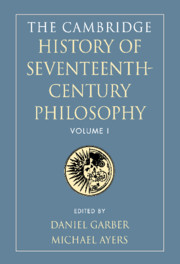Book contents
- Frontmatter
- Introduction
- I The context of seventeenth-century philosophy
- II Logic, language, and abstract objects
- III God
- IV Body and the physical world
- 15 The scholastic background
- 16 The occultist tradition and its critics
- 17 Doctrines of explanation in late scholasticism and in the mechanical philosophy
- 18 New doctrines of body and its powers, place, and space
- 19 Knowledge of the existence of body
- 20 New doctrines of motion
- 21 Laws of nature
- 22 The mathematical realm of nature
- V Spirit
- Bibliographical appendix
- Bibliography
- References
20 - New doctrines of motion
from IV - Body and the physical world
Published online by Cambridge University Press: 28 March 2008
- Frontmatter
- Introduction
- I The context of seventeenth-century philosophy
- II Logic, language, and abstract objects
- III God
- IV Body and the physical world
- 15 The scholastic background
- 16 The occultist tradition and its critics
- 17 Doctrines of explanation in late scholasticism and in the mechanical philosophy
- 18 New doctrines of body and its powers, place, and space
- 19 Knowledge of the existence of body
- 20 New doctrines of motion
- 21 Laws of nature
- 22 The mathematical realm of nature
- V Spirit
- Bibliographical appendix
- Bibliography
- References
Summary
INTRODUCTION
As noted in Chapter 15, Aristotle and the Peripatetics held that local motion is primary with respect to all other kinds of motion or change. Proponents of the new natural philosophies of the seventeenth century, including neo-atomists and those of Stoic inspiration, would have accepted this view and, indeed, would not have spurned the way it was presented by some of the later Peripatetics. They would not have been out of sympathy with the Aristotelian Keckermann, whose teaching on this issue in the Danzig Gymnasium in 1607 was not far removed from the new understanding of the rôle of local motion: ‘According to the order of nature, local motion is the first among motions, partly because it is common to the totality of all natural bodies, partly also because the other motions arise from it as from a cause [tanquam à causa]’. Nor would they have been seriously at odds with Chasteigner de la Rochepozay: ‘All other motions are included in local motion as in a cause [ut in causa], on account of [its being] the primary motion, because it is the cause of every corporeal motion, and without it there cannot be any other motion’. Yet it is not clear whether the causality in these texts is real or analogical or, if real (assuming it to be efficient), whether proximate, partial, or productive efficient causality is intended. The causal rôle reserved for local motion by some early seventeenth-century scholastics is still not the special rôle reserved for it by the proponents of the mechanical philosophy.
- Type
- Chapter
- Information
- The Cambridge History of Seventeenth-Century Philosophy , pp. 649 - 679Publisher: Cambridge University PressPrint publication year: 2000
References
- 7
- Cited by



